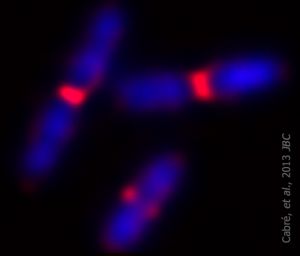When it is time for a bacterium to divide, the membrane in its mid-zone folds inward. This fold, which looks like a valley running along the cell’s equator, becomes deeper and deeper until it finally gives rise to two daughter bacteria.
A review article published by researchers at the Centro Nacional de Biotecnología of the CSIC (CNB-CSIC) explains how a whole arsenal of proteins works together to carry out this task. The study was published this month in the journal FEMS Microbiology Reviews.
As the scientists explain, the protagonist of this process is the FtsZ protein, which assembles inside the cell to form a ring at its equator. "In bacteria, FtsZ does not act alone, but is aided by at least ten other proteins with which it associates and interacts," explains Miguel Vicente, lead author of the article.
Two of the study's co-authors, Cristina Ortiz and Laura Cueto, state that "understanding the mechanism of bacterial division is essential in order to develop new antibiotics," and add that such drugs could replace those used to date, which are no longer effective against new resistant pathogens.
Just as if it were the Tolkien novel, the researchers explain that FtsZ, the main Lord of the Ring, is accompanied by FtsA and ZipA, two proteins needed to complete the structure. Together with these three, a few others are responsible for ensuring correct location and timing, as well as to destroy the ring once the mission is completed.
According to the authors, each cell needs between 3000 and 5000 FtsZ molecules, from 50 to 200 of FtsA, and up to 1500 ZipA molecules to complete the ring.
- Ortiz C, Natale P, Cueto L, Vicente M. The keepers of the ring: regulators of FtsZ assembly. FEMS Microbiol Rev. 2015 Sep 15. pii: fuv040






